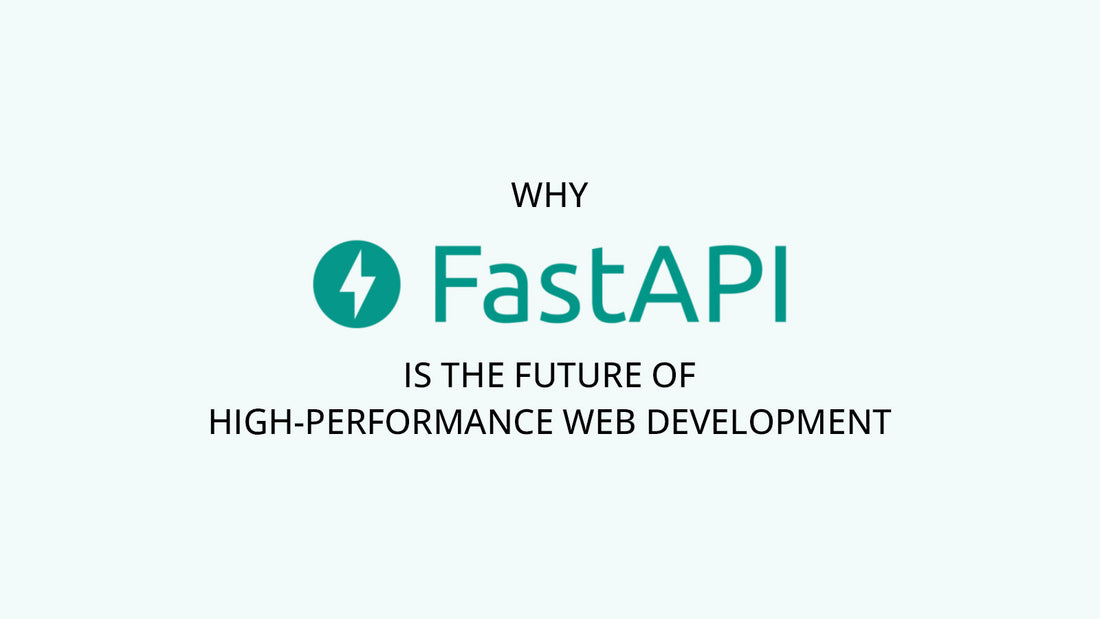
Why FastAPI is the Future of High-Performance Web Development
Share
In the ever-evolving landscape of web development, performance, scalability, and developer efficiency have become non-negotiable. As applications grow more complex and data-heavy, developers need frameworks that can keep up with both user expectations and business demands. FastAPI, a modern Python web framework, is quickly emerging as a game-changer in this space—redefining what “fast” truly means in API development.
What is FastAPI?
FastAPI is an open-source web framework built on top of Starlette (for the web parts) and Pydantic (for data validation). Created by Sebastián Ramírez, it’s designed to deliver high performance while keeping the code clean, simple, and developer-friendly.
In essence, FastAPI is all about speed, simplicity, and type safety. It’s fully compatible with Python type hints, allowing developers to write APIs that are not only fast to execute but also easier to maintain, test, and document.
1. Lightning-Fast Performance
FastAPI’s name isn’t just marketing—it’s one of the fastest Python frameworks available today. Benchmarks consistently show it performing on par with Node.js and Go for many use cases.
This speed comes from its asynchronous nature. Using async and await syntax, FastAPI can handle multiple requests concurrently, making it ideal for high-performance applications that demand scalability—like real-time analytics dashboards, chat applications, or IoT backends.
2. Built-In Data Validation and Type Checking
One of FastAPI’s standout features is its automatic data validation powered by Pydantic. You simply define your request and response models using Python classes and type hints, and FastAPI takes care of the rest—ensuring that data is validated before it reaches your application logic.
This eliminates a major source of runtime errors and boosts developer productivity, all while maintaining clean and readable code.
3. Automatic Interactive API Documentation
FastAPI automatically generates interactive API documentation using Swagger UI and ReDoc.
This means developers get production-ready documentation at no extra cost or effort.
Whether you’re onboarding a new team member or showcasing your API to stakeholders, this built-in documentation saves hours of manual work and improves collaboration across teams.
4. Asynchronous by Design
FastAPI embraces modern asynchronous programming from the ground up. Unlike older frameworks that had to retrofit async capabilities, FastAPI’s architecture was designed with it in mind.
This makes it ideal for building microservices or applications that interact heavily with external APIs and databases, where non-blocking operations can dramatically reduce response times and server costs.
5. Developer-Friendly Experience
From auto-completion to error handling, FastAPI offers a developer experience that few frameworks can match.
It’s built to minimize boilerplate while maximizing clarity, letting developers focus on logic instead of configuration.
Its tight integration with Python type hints also enables better editor support, meaning fewer bugs, faster development, and cleaner deployments.
6. Perfect for Modern Use Cases
FastAPI is being adopted rapidly by startups and enterprises alike, especially for:
- Machine Learning APIs (serving AI models at scale)
- Microservices architectures
- IoT and real-time applications
- Cloud-native deployments using Docker and Kubernetes
Its compatibility with tools like Uvicorn, Gunicorn, and Docker makes it perfect for high-performance production environments.
7. Backed by a Thriving Community
FastAPI’s community is growing at a remarkable pace.
From extensive documentation to third-party libraries, tutorials, and GitHub contributions, the ecosystem is vibrant and supportive—making it easier for teams to find solutions and integrate new features quickly.
The Future is Fast
As the demand for real-time, data-driven, and scalable applications continues to rise, FastAPI stands at the forefront of modern web frameworks.
It brings together the best of both worlds: Python’s simplicity and asynchronous performance at scale.
For developers and businesses looking to future-proof their web applications, FastAPI isn’t just an option—it’s the future.
